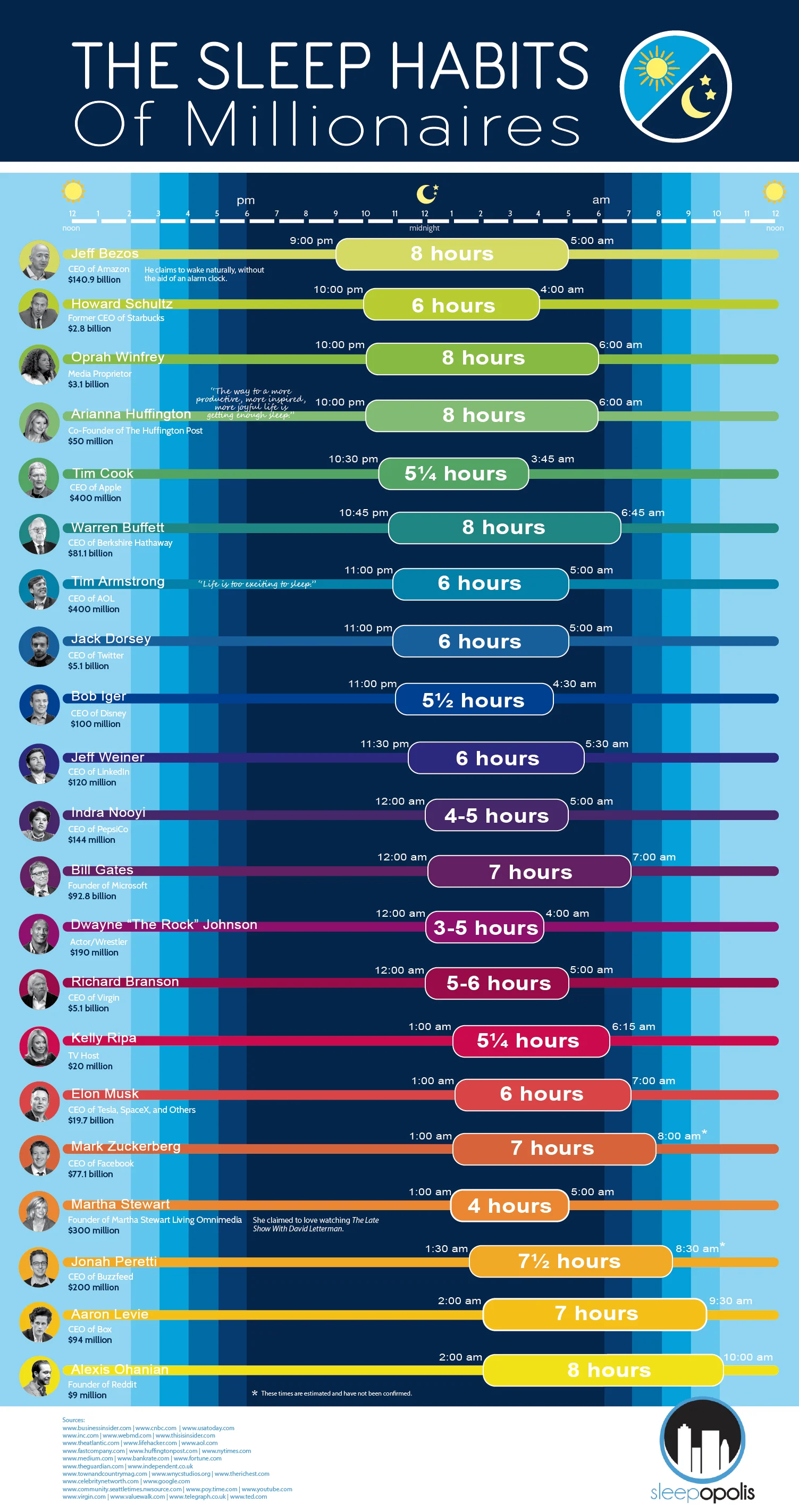
If you could make a million dollars by giving up good sleep, would you do it? Millionaire sleep habits have us pondering this question as a handful of millionaires and billionaires say getting less sleep is part of their secret, while others have found success without skimping on their beauty rest.
Elon Musk, Richard Branson, and Arnold Schwarzenegger say they get about six hours a night, one hour less than the minimum seven hours recommended by the American Academy of Sleep Medicine (AASM). (1) (2) During the height of his career, Puff Daddy reported sleeping only five hours a night, and Dwayne “the Rock” Johnson has said in interviews he typically clocks in as little as three hours of nightly sleep.
On the other extreme, Lebron James claims he gets 12 hours of sleep per day: eight to nine of those overnight, plus naps. Jeff Bezos shoots for eight hours a night, and Bill Gates gets seven. So what do all these people have in common? It’s not sleep, that’s for sure…
But some extremely wealthy people do seem to get by on less sleep, and you may feel like cutting your zzzs in favor of future prosperity. Below, we’ll dig into how little sleep you can live with and how to climb the ladder of success while also getting quality rest.
Fast Facts on Millionaires Sleep Habits
- Even though some celebs like Dwayne Johnson claim to get by on very little sleep, most successful millionaires need just as much as the rest of us.
- A millionaire’s success lies in their work-ethic, proactivity, strategic thinking, and continually learning and developing their skills.
- Good sleep hygiene can help you find success in sleep and your career, and includes practices like a regular sleep schedule, cozy sleep environment, and avoiding caffeine, alcohol, and exercise before bed.

Like this infographic? Consider sharing it with this link or embed on your own site with the embed code below!
Does Sleeping Less Actually Make You More Successful?
Maybe in the short term, says Riley Jarvis, who specializes in coaching entrepreneurs, business executives, and other top performers on achieving their business goals through better sleep. “I’ve found a number of highly successful people do skimp on sleep while they are in a ‘grinding’ phase building their business and use coffee and other stimulants to keep them going on a ‘dirty charge,’” says Jarvis, but most people can’t make this a long-term habit.
Dr. Andrew Namen, M.D., AASM spokesperson and medical director of the Wake Forest Sleep Program, says skimping on sleep can actually hurt your chances of career gain. “While it may seem like skipping sleep allows for more time to work, the quality of your work is likely to suffer secondary to the memory loss and increased errors attributed to sleep debt,” says Namen, who adds that sleep deprivation can also lower productivity, stifle creativity, and make it harder to problem-solve, make decisions, and communicate effectively with your team. (3)
When you get good sleep, agrees Jarvis, you can get more done in less time. “Through better sleep comes better health and performance.” (4)
The Short Sleeper Gene
The vast majority of us need seven to nine hours of sleep every night to feel rested and stay healthy. (2) With one exception: the oh-so-lucky short-sleepers. A tiny percentage of people have a mutation in their genetic code that allows them to get four to six hours of sleep a day with no negative effects. (5) (6)
Sometimes called short sleeper syndrome, or SSS, this small group of people feel energetic and rested after much less sleep than the rest of us. (5) However, this discovery is so new and so rare that researchers have so far only found 50 families with this genetic mutation. (5)
Long story short? You probably don’t have the short-sleeper gene. (Sorry) So, if short sleeper genes are so rare, prospective millionaires shouldn’t focus on cutting their sleep short to get ahead. But don’t worry! We have some tips to help you get good sleep and career wins.
What Really Makes Millionaires Successful
“What makes a millionaire successful is their total work output x their effectiveness. Their work-ethic, proactivity, thinking strategically, and continuously learning and developing their skills relentlessly are a big form of their success,” says Jarvis.
Good sleep can majorly boost your performance, Jarvis adds. (4) In fact, research has found that wealthy people actually sleep more: the lower the income, the less sleep people report. (7) So how can you make your fortune without skipping sleep?
Tips for Finding Success Without Skipping Sleep
Not only can you find success without skipping sleep, good sleep will help you get where you’re going. Jarvis recommends upping the quality of your sleep through good sleep hygiene.
Sleep hygiene describes how you set yourself up for excellent sleep and includes avoiding electronics before bed, steering clear of caffeine and alcohol pre-sleep, keeping a consistent bedtime routine and sleep schedule, and making your sleep environment inviting, cool, and dark. (8)
“Try implementing other healthy habits that can allow you to practice good sleep hygiene, like creating a sleep-friendly environment, practicing time management and stress management techniques, and setting boundaries with work, social plans, and any other stressors in your life,” says Namen. (9)
For business wins that allow for good sleep, Jarvis recommends external techniques like time blocking, delegating tasks, improving systems and processes, and focusing on high-leverage activities.
FAQs
Are there celebrities who actually sleep a lot?
Lebron James claims he gets 12 hours of sleep per day: eight to nine of those overnight, plus naps. Jeff Bezos shoots for eight hours a night and Bill Gates gets seven. (1)
Does being a short sleeper impact intelligence?
“Short sleep duration has been associated with cognitive impairment and decreased cognitive performance, including difficulties with attention, memory and problem-solving skills,” says Namen. However, if you have the short-sleeper gene mutation, your brain function may not take a dip on less sleep. (5)
The Last Word From Sleepopolis
While some uber wealthy celebrities may say they get by on a handful of sleep hours, the vast majority of people need more. “Sleep is one of the three pillars of a healthy lifestyle, along with diet and exercise, so making time for it is important,” says Namen. “Make it a goal to get seven to eight hours of healthy sleep every night so you wake up feeling refreshed and ready to take on the day.” The TLDR: Better sleep — in the proper quantities — will keep you on the path to your goals.
Sources
- The Sleeping Habits & Routines of 18 Successful People – Balance The Grind. Accessed May 8, 2024. https://balancethegrind.co/collections/the-sleeping-habits-routines-of-18-successful-people/
- Sleep FAQs – Sleep Education by the AASM. Accessed May 8, 2024. https://sleepeducation.org/sleep-faqs/
- Sleep Deprivation and Deficiency – What Are Sleep Deprivation and Deficiency? | NHLBI, NIH. Accessed November 4, 2023. https://www.nhlbi.nih.gov/health/sleep-deprivation
- Brain Basics: Understanding Sleep | National Institute of Neurological Disorders and Stroke. Accessed October 3, 2023. https://www.ninds.nih.gov/health-information/public-education/brain-basics/brain-basics-understanding-sleep
- Short Sleeper Syndrome: What It Is, Symptoms & Treatment. Accessed May 8, 2024. https://my.clevelandclinic.org/health/diseases/short-sleeper-syndrome-sss
- Gene identified in people who need little sleep | National Institutes of Health (NIH). Accessed May 8, 2024. https://www.nih.gov/news-events/nih-research-matters/gene-identified-people-who-need-little-sleep
- Prevalence and Geographic Patterns of Self-Reported Short Sleep Duration Among US Adults, 2020. Accessed May 8, 2024. https://www.cdc.gov/pcd/issues/2023/22_0400.htm
- Espie CA. The ‘5 principles’ of good sleep health. Journal of Sleep Research. 2022;31(3):e13502. doi:10.1111/jsr.13502
- Stress | NCCIH. Accessed May 10, 2024. https://www.nccih.nih.gov/health/stress
Namen, Andrew, MD. Personal Interview. May 6, 2024.
Jarvis, Riley. Personal Interview. May 2, 2024.

























